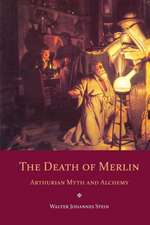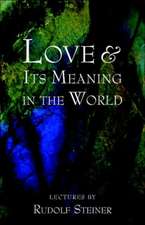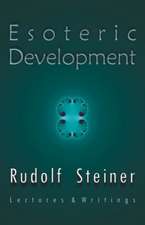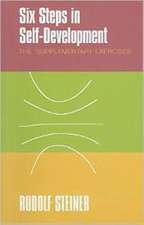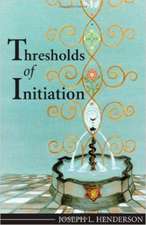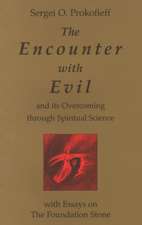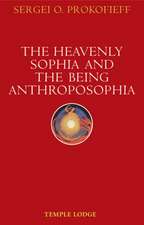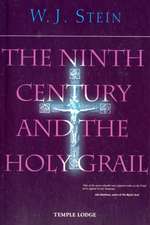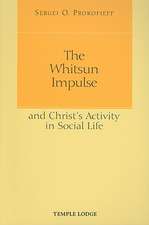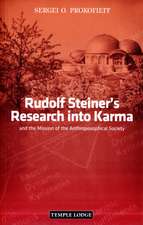Presence: Human Purpose and the Field of the Future
Autor Peter Senge, C. Otto Scharmer, Joseph Jaworskien Limba Engleză Paperback – 31 dec 2007
Drawing on the wisdom and experience of 150 scientists, social leaders, and entrepreneurs, including Brian Arthur, Rupert Sheldrake, Buckminster Fuller, Lao Tzu, and Carl Jung, Presence is both revolutionary in its exploration and hopeful in its message. This astonishing and completely original work goes on to define the capabilities that underlie our ability to see, sense, and realize new possibilities—in ourselves, in our institutions and organizations, and in society itself.
Preț: 102.71 lei
Nou
Puncte Express: 154
Preț estimativ în valută:
19.65€ • 20.57$ • 16.36£
19.65€ • 20.57$ • 16.36£
Carte disponibilă
Livrare economică 08-22 martie
Preluare comenzi: 021 569.72.76
Specificații
ISBN-13: 9780385516303
ISBN-10: 0385516304
Pagini: 289
Dimensiuni: 141 x 211 x 18 mm
Greutate: 0.28 kg
Editura: Broadway Business
ISBN-10: 0385516304
Pagini: 289
Dimensiuni: 141 x 211 x 18 mm
Greutate: 0.28 kg
Editura: Broadway Business
Notă biografică
Peter Senge is a senior lecturer at the Massachusetts Institute of Technology, the founding chair of SoL, a renowned pioneer, theorist, and writer in the field of management innovation, and the author of the widely acclaimed book, The Fifth Discipline: The Art and Practice of the Learning Organization (Doubleday/Currency, 1990). C. Otto Scharmer is a lecturer at the MIT Sloan School of Management, a Visiting Professor at the Helsinki School of Economics, and international action researcher, and author of the forthcoming book Theory U: Leading from the Emerging Future. Joseph Jaworski is the chairman of Generon Consulting, cofounder of the Global Leadership Initiative, and author of the critically acclaimed Synchronicity: The Inner Path of Leadership (Berrett-Koehler, 1996). Prior to her current role as director of the Johnson Presidential Library and Museum, Betty Sue Flowers was a professor of English at the University of Texas at Austin and an international business consultant.
SoL (The Society for Organizational Learning, Inc.), an outgrowth of the former MIT Center for Organizational Learning, is a nonprofit international membership organization that connects researchers, organizations, and consultants in over thirty countries in building knowledge for systemic change. A portion of the net proceeds from SoL publishing sales are reinvested in basic research, applied learning projects, and building a global network of learning communities.
SoL (The Society for Organizational Learning, Inc.), an outgrowth of the former MIT Center for Organizational Learning, is a nonprofit international membership organization that connects researchers, organizations, and consultants in over thirty countries in building knowledge for systemic change. A portion of the net proceeds from SoL publishing sales are reinvested in basic research, applied learning projects, and building a global network of learning communities.
Extras
1
The Requiem Scenario
November 2000
T he four of us were sitting in a circle in the study of Otto’s home on Maple Avenue in Cambridge, Massachusetts. Outside, a light snow was falling. Inside, under the windows, Otto had placed bright red poinsettias. The walls were covered with charts, several with a large U drawn on them. Books were neatly stacked everywhere, and in one corner a computer hummed quietly.
“When Otto said that Jurassic Park was written in this house, I couldn’t help thinking how ironic it was, given our conversations,” said Betty Sue. “Now here we are sitting in the ‘house of the dinosaurs’ talking about a real-life nightmare scenario: the destruction of our environment; the growing social divide between rich and poor; the potential dangers of things like biotechnology; and escalating violence around the world.”
“Isn’t it ironic the way people talk about dinosaurs?” Peter said. “Today we say an organization is ‘just like a dinosaur’ when we mean it’s slow and can’t adjust to change. But you know, the dinosaurs did manage to survive over a hundred times longer than humans have so far. Whatever beings might take our place here in the future will probably say, ‘Just like the human beings–too bad they didn’t have the adaptive capabilities of dinosaurs!’”
Betty Sue shuddered. “Hearing human beings talked about in the past tense like that is terribly chilling. I guess we all know that since we have the means to destroy ourselves, it’s possible that we will. The unthinkable is possible, but it’s still very difficult to consider. The poet Auden said, ‘We must love one another or die.’ No one thinks we’re very close to loving one another just yet, but we also don’t seem willing to consider the consequences of not doing so.”
“And that’s why we don’t change,” Peter replied. “I was speaking at a conference on business and the environment last week, and stayed at a conference center that I first visited twenty years ago. This center hosts a conference every year at which a prestigious environmental sustainability award is given, so you would expect it to be a showcase for environmentally sound practices, but I'm sure this place generates more waste per customer than they did twenty years ago.
“Everything is individually wrapped–coffee, sugar, shampoo– and each container will be thrown away. The materials used in the room were no more environmentally sound then they had been twenty years ago–the wood hadn’t been sustainably harvested, the plastics and materials couldn’t be recycled, and the appliances couldn’t be remanufactured. I had asked for a room where I could open the windows. They didn’t have any because they relied on central air-conditioning and heating. The electricity that drove the air conditioning undoubtedly came mostly from power plants that burned coal and other fossil fuels–heating up the earth in order to cool off our rooms. Then I saw this silly little bar of soap, individually wrapped. Somehow it epitomized the whole situation.
“Those soaps end up being ninety percent wasted–waste that is completely unnecessary. They could easily be replaced by liquid soap dispensers that create almost no waste. There are even biodegradable liquid soaps now. One is manufactured by a supplier in Sweden, partly owned by Scandic, which has gone from a mediocre, financially strapped business to one of Sweden’s most financially successful hotel chains, in part through its commitment to ‘the sustainable hotel room.’ There’s no reason being environmentally smart can’t be good for business as well–at least in Sweden.
“So I stood there looking at this little bar of soap, listening to my air conditioner whir in the background, feeling angrier and angrier, and wondered why this American conference center still hadn’t learned in twenty years what the Swedish hotel chain had learned in a few years. Why were we even still bothering to hold conferences about environmental business practices? Do we Americans care at all about the effects we’re having on the natural environment that all life must share? Then I saw the only artifact of environmental consciousness in the whole room–a little card that said, ‘In order to help the environment, we won’t do your linens if you don’t ask us to.’ Give me a break! After twenty years, all we’ve accomplished is they won’t wash our linens if we don’t ask them to!”
“We’ve all known the frustration and discouragement you were feeling,” said Betty Sue. “At least I have. But are you saying that we avoid these issues to avoid the discouragement?”
“Not quite.” Peter paused and continued quietly, “I had a difficult meditation this morning. It was very disturbing, as sometimes they are. I seemed to be in touch with an extraordinary fear–just the fear by itself, no thoughts or associations.
“This fear is probably present more than I’m willing to see, except when it suddenly pokes through like it did this morning. The anger I felt at the hotel came from this deeper fear. I’ve known about the threats to the environment for so long–but the changes we’ve made are so small, given what’s needed and what we’re capable of achieving.
“If the future is going to be different, we have to go far beyond these little piecemeal gestures and begin to see the systems in which we’re embedded–and I guess I have doubts if we’re up for this. The question isn’t, ‘Do you want your bed linens changed?’ It’s more like, ‘Do you want to change the way you live?’ But this question sits on top of an immense fear, and I think that, Betty Sue, is one reason we prefer not to think, or talk, about these things.”
Joseph leaned forward. “But isn’t that why we’re here? Haven’t we come together to answer one fundamental question: Why don’t we change? What would it take to shift the whole?”
“We don’t change because we think we’re immortal.” Otto’s tone was matter-of-fact. “Like teenagers, we might be afraid, but we still think we’ll go on forever.”
“Perhaps that’s true,” said Joseph, shaking his head. “I recently read an article that’s been circulating in the foundation community written by a man named Jack Miles, a senior adviser to the J. Paul Getty Trust, called ‘Global Requiem.’1 It’s a speculation about what would happen if we started to realize that humankind might not overcome these problems, that we might not develop a sustainable society–that the human race might perish. It’s an exploration of the unthinkable.”
“But don’t scenarios like that evoke the very fear Peter is talking about?” Otto asked. “As he showed, this sort of fear is usually met by denial or simply makes us feel hopeless.”
“But that doesn’t have to happen,” Joseph replied. “I’ve seen many instances where imagining alternative futures, even negative futures, can actually open people up.”
“Scenarios can alter people’s awareness,” Betty Sue agreed. “If they’re used artfully, people actually begin to think about a future that they’ve ignored or denied. The key is to see the different future not as inevitable, but as one of several genuine possibilities.
“Maybe if people really believed we could be headed for extinction, we would do collectively what many people do individually when they know they may actually die–we would suddenly see our lives very clearly.”
“If we could actually face our collective mortality–and simply tell the truth about the fear, rather than avoiding it–perhaps something would shift,” said Peter.
“Several years ago in one of our leadership workshops, a Jamaican man from the World Bank named Fred told a story that moved people very deeply. A few years earlier he had been diagnosed with a terminal disease. After consulting a number of doctors, who all confirmed the diagnosis, he went through what everyone does in that situation. For weeks he denied it. But gradually, with the help of friends, he came to grips with the fact that he was only going to live a few more months. ‘Then something amazing happened,’ he said. ‘I simply stopped doing everything that wasn’t essential, that didn’t matter. I started working on projects with kids that I’d always wanted to do. I stopped arguing with my mother. When someone cut me off in traffic or something happened that would have upset me in the past, I didn’t get upset. I just didn’t have the time to waste on any of that.’
“Near the end of this period, Fred began a wonderful new relationship with a woman who thought that he should get more opinions about his condition. He consulted some doctors in the States and soon after got a phone call saying, ‘We have a different diagnosis.’ The doctor told him he had a rare form of a very curable disease. And then came the part of the story I’ll never forget. Fred said, ‘When I heard this over the telephone, I cried like a baby–because I was afraid my life would go back to the way it used to be.’
“It took a scenario that he was going to die for Fred to wake up. It took that kind of shock for his life to be transformed. Maybe that’s what needs to happen for all of us, for everyone who lives on Earth. That could be what a requiem scenario offers us.”
There was silence for a moment.
“You know,” said Joseph quietly, “When all is said and done, the only change that will make a difference is the transformation of the human heart.”
2
Seeing Our Seeing
In the movie The Truman Show, actor Jim Carey plays a man whose entire life is a television show, broadcast to millions, unknown to Truman himself. From his point of view, he is just living his life. In the middle of the movie, a group of reporters interview “the director,” the Godlike figure played by Ed Harris who literally determines Truman’s life–whether it’s going to rain or be sunny, the plot for the next week’s story, whether or not things will turn out OK for Truman. One interviewer asks the director, “How do you explain that Truman has never figured out that his whole life is just a television show?” The director responds, “We all accept reality as it is presented to us.”
Like Truman, our awareness presents itself to us as immediate and unmistakable. A table. A book. A sentence or word.Yet there is always much more than we “see.”(1) In the table are also a factory and workers, a tree, a forest, water and soil, and rain clouds. Indeed, a book contains all of these as well. And a simple word or sentence that moves us speaks of a lifetime–of schools and teachers, of questions and dreams, of current problems and possibilities. With just the slightest pause, we can begin to appreciate the symphony of activities and experiences, past and present, that come together in each simple moment of awareness.Yet out of the symphony we typically hear only one or two notes. And these, almost always, are the ones most familiar to us.
The problems that arise from taking our everyday awareness as “given” are anything but “merely philosophical,” especially when our world is changing.
In the early 1980s, executives from U.S. auto companies started making regular trips to Japan to find out why the Japanese automakers were outperforming their U.S. counterparts. Speaking with one Detroit executive after such a visit, Peter could see that the executive hadn’t been impressed by the competition. “They didn’t show us real plants,” the Detroit executive said.
“Why do you say that?” Peter asked.
“Because there were no inventories. I’ve seen plenty of assembly facilities in my life, and these were not real plants. They’d been staged for our tour.”
Within a few years, it became painfully obvious how wrong this assessment was. These managers had been exposed to a radically different type of “just-in-time” production system, and they were not prepared to see what they were being exposed to. They were unprepared for an assembly facility that didn’t have huge piles of inventory.(2) What they saw was bounded by what they already knew. They hadn’t developed the capacity for seeing with fresh eyes.
With hindsight, it’s easy to dismiss the “seeing” problem of the Detroit executives as idiosyncratic. But this problem is universal. Most change initiatives that end up going nowhere don’t fail because they lack grand visions and noble intentions. They fail because people can’t see the reality they face. Likewise, studies of corporate mortality show that most Fortune 500 companies fail to outlast a few generations of management not because of resource constraints but because they are unable to “see” the threats they face and the imperative to change. “The signals of threat are always abundant and recognized by many,” says Arie de Geus. “Yet somehow they fail to penetrate the corporate immune system response to reject the unfamiliar.”
The Capacity to Suspend
Seeing freshly starts with stopping our habitual ways of thinking and perceiving. According to cognitive scientist Francisco Varela, developing the capacity for this sort of stopping involves “suspension, removing ourselves from the habitual stream [of thought].” Varela called suspension the first basic “gesture” in enhancing awareness. As the noted physicist David Bohm used to say, “Normally, our thoughts have us rather than we having them.”(3) Suspending does not require destroying our existing mental models of reality–which would be impossible even if we tried–or ignoring them. Rather, it entails what Bohm called “hanging our assumptions in front of us.”(4) By doing so, we begin to notice our thoughts and mental models as the workings of our own mind. And as we become aware of our thoughts, they begin to have less influence on what we see. Suspension allows us to “see our seeing.”
Sometimes it’s easier for people to understand suspension physically than conceptually. A very simple physical practice to appreciate suspension starts with sitting on a chair and grabbing its sides. Now hold the sides of the chair more tightly.You might even imagine that there is no gravity and that if you let go, you would float right up out of the chair. Notice how your body feels as you hold tightly to the chair: the tension in your arms, your shoulders and back, stomach and neck. Now release your hold on the chair. Feel all these muscles relax. Often we hold on to our thoughts in much the same way. Suspension starts when we release the hold and simply notice our current thoughts, like noticing the chair you are sitting on. The thoughts may not go away immediately, but we no longer have as much energy tied up in holding on to them.
When we begin to develop a capacity for suspension, we almost immediately encounter the “fear, judgment, and chattering of the mind” that Michael Ray calls the “Voice of Judgment.” Ray, creator of highly popular Stanford Business School courses on creativity,(5) starts with three assumptions: (1) that creativity “is essential for health, happiness, and success in all areas of life, including business”; (2) that “creativity is within everyone”; and (3) that even though it’s within everyone, it’s “covered over by the Voice of Judgement.”(6)
From the Hardcover edition.
The Requiem Scenario
November 2000
T he four of us were sitting in a circle in the study of Otto’s home on Maple Avenue in Cambridge, Massachusetts. Outside, a light snow was falling. Inside, under the windows, Otto had placed bright red poinsettias. The walls were covered with charts, several with a large U drawn on them. Books were neatly stacked everywhere, and in one corner a computer hummed quietly.
“When Otto said that Jurassic Park was written in this house, I couldn’t help thinking how ironic it was, given our conversations,” said Betty Sue. “Now here we are sitting in the ‘house of the dinosaurs’ talking about a real-life nightmare scenario: the destruction of our environment; the growing social divide between rich and poor; the potential dangers of things like biotechnology; and escalating violence around the world.”
“Isn’t it ironic the way people talk about dinosaurs?” Peter said. “Today we say an organization is ‘just like a dinosaur’ when we mean it’s slow and can’t adjust to change. But you know, the dinosaurs did manage to survive over a hundred times longer than humans have so far. Whatever beings might take our place here in the future will probably say, ‘Just like the human beings–too bad they didn’t have the adaptive capabilities of dinosaurs!’”
Betty Sue shuddered. “Hearing human beings talked about in the past tense like that is terribly chilling. I guess we all know that since we have the means to destroy ourselves, it’s possible that we will. The unthinkable is possible, but it’s still very difficult to consider. The poet Auden said, ‘We must love one another or die.’ No one thinks we’re very close to loving one another just yet, but we also don’t seem willing to consider the consequences of not doing so.”
“And that’s why we don’t change,” Peter replied. “I was speaking at a conference on business and the environment last week, and stayed at a conference center that I first visited twenty years ago. This center hosts a conference every year at which a prestigious environmental sustainability award is given, so you would expect it to be a showcase for environmentally sound practices, but I'm sure this place generates more waste per customer than they did twenty years ago.
“Everything is individually wrapped–coffee, sugar, shampoo– and each container will be thrown away. The materials used in the room were no more environmentally sound then they had been twenty years ago–the wood hadn’t been sustainably harvested, the plastics and materials couldn’t be recycled, and the appliances couldn’t be remanufactured. I had asked for a room where I could open the windows. They didn’t have any because they relied on central air-conditioning and heating. The electricity that drove the air conditioning undoubtedly came mostly from power plants that burned coal and other fossil fuels–heating up the earth in order to cool off our rooms. Then I saw this silly little bar of soap, individually wrapped. Somehow it epitomized the whole situation.
“Those soaps end up being ninety percent wasted–waste that is completely unnecessary. They could easily be replaced by liquid soap dispensers that create almost no waste. There are even biodegradable liquid soaps now. One is manufactured by a supplier in Sweden, partly owned by Scandic, which has gone from a mediocre, financially strapped business to one of Sweden’s most financially successful hotel chains, in part through its commitment to ‘the sustainable hotel room.’ There’s no reason being environmentally smart can’t be good for business as well–at least in Sweden.
“So I stood there looking at this little bar of soap, listening to my air conditioner whir in the background, feeling angrier and angrier, and wondered why this American conference center still hadn’t learned in twenty years what the Swedish hotel chain had learned in a few years. Why were we even still bothering to hold conferences about environmental business practices? Do we Americans care at all about the effects we’re having on the natural environment that all life must share? Then I saw the only artifact of environmental consciousness in the whole room–a little card that said, ‘In order to help the environment, we won’t do your linens if you don’t ask us to.’ Give me a break! After twenty years, all we’ve accomplished is they won’t wash our linens if we don’t ask them to!”
“We’ve all known the frustration and discouragement you were feeling,” said Betty Sue. “At least I have. But are you saying that we avoid these issues to avoid the discouragement?”
“Not quite.” Peter paused and continued quietly, “I had a difficult meditation this morning. It was very disturbing, as sometimes they are. I seemed to be in touch with an extraordinary fear–just the fear by itself, no thoughts or associations.
“This fear is probably present more than I’m willing to see, except when it suddenly pokes through like it did this morning. The anger I felt at the hotel came from this deeper fear. I’ve known about the threats to the environment for so long–but the changes we’ve made are so small, given what’s needed and what we’re capable of achieving.
“If the future is going to be different, we have to go far beyond these little piecemeal gestures and begin to see the systems in which we’re embedded–and I guess I have doubts if we’re up for this. The question isn’t, ‘Do you want your bed linens changed?’ It’s more like, ‘Do you want to change the way you live?’ But this question sits on top of an immense fear, and I think that, Betty Sue, is one reason we prefer not to think, or talk, about these things.”
Joseph leaned forward. “But isn’t that why we’re here? Haven’t we come together to answer one fundamental question: Why don’t we change? What would it take to shift the whole?”
“We don’t change because we think we’re immortal.” Otto’s tone was matter-of-fact. “Like teenagers, we might be afraid, but we still think we’ll go on forever.”
“Perhaps that’s true,” said Joseph, shaking his head. “I recently read an article that’s been circulating in the foundation community written by a man named Jack Miles, a senior adviser to the J. Paul Getty Trust, called ‘Global Requiem.’1 It’s a speculation about what would happen if we started to realize that humankind might not overcome these problems, that we might not develop a sustainable society–that the human race might perish. It’s an exploration of the unthinkable.”
“But don’t scenarios like that evoke the very fear Peter is talking about?” Otto asked. “As he showed, this sort of fear is usually met by denial or simply makes us feel hopeless.”
“But that doesn’t have to happen,” Joseph replied. “I’ve seen many instances where imagining alternative futures, even negative futures, can actually open people up.”
“Scenarios can alter people’s awareness,” Betty Sue agreed. “If they’re used artfully, people actually begin to think about a future that they’ve ignored or denied. The key is to see the different future not as inevitable, but as one of several genuine possibilities.
“Maybe if people really believed we could be headed for extinction, we would do collectively what many people do individually when they know they may actually die–we would suddenly see our lives very clearly.”
“If we could actually face our collective mortality–and simply tell the truth about the fear, rather than avoiding it–perhaps something would shift,” said Peter.
“Several years ago in one of our leadership workshops, a Jamaican man from the World Bank named Fred told a story that moved people very deeply. A few years earlier he had been diagnosed with a terminal disease. After consulting a number of doctors, who all confirmed the diagnosis, he went through what everyone does in that situation. For weeks he denied it. But gradually, with the help of friends, he came to grips with the fact that he was only going to live a few more months. ‘Then something amazing happened,’ he said. ‘I simply stopped doing everything that wasn’t essential, that didn’t matter. I started working on projects with kids that I’d always wanted to do. I stopped arguing with my mother. When someone cut me off in traffic or something happened that would have upset me in the past, I didn’t get upset. I just didn’t have the time to waste on any of that.’
“Near the end of this period, Fred began a wonderful new relationship with a woman who thought that he should get more opinions about his condition. He consulted some doctors in the States and soon after got a phone call saying, ‘We have a different diagnosis.’ The doctor told him he had a rare form of a very curable disease. And then came the part of the story I’ll never forget. Fred said, ‘When I heard this over the telephone, I cried like a baby–because I was afraid my life would go back to the way it used to be.’
“It took a scenario that he was going to die for Fred to wake up. It took that kind of shock for his life to be transformed. Maybe that’s what needs to happen for all of us, for everyone who lives on Earth. That could be what a requiem scenario offers us.”
There was silence for a moment.
“You know,” said Joseph quietly, “When all is said and done, the only change that will make a difference is the transformation of the human heart.”
2
Seeing Our Seeing
In the movie The Truman Show, actor Jim Carey plays a man whose entire life is a television show, broadcast to millions, unknown to Truman himself. From his point of view, he is just living his life. In the middle of the movie, a group of reporters interview “the director,” the Godlike figure played by Ed Harris who literally determines Truman’s life–whether it’s going to rain or be sunny, the plot for the next week’s story, whether or not things will turn out OK for Truman. One interviewer asks the director, “How do you explain that Truman has never figured out that his whole life is just a television show?” The director responds, “We all accept reality as it is presented to us.”
Like Truman, our awareness presents itself to us as immediate and unmistakable. A table. A book. A sentence or word.Yet there is always much more than we “see.”(1) In the table are also a factory and workers, a tree, a forest, water and soil, and rain clouds. Indeed, a book contains all of these as well. And a simple word or sentence that moves us speaks of a lifetime–of schools and teachers, of questions and dreams, of current problems and possibilities. With just the slightest pause, we can begin to appreciate the symphony of activities and experiences, past and present, that come together in each simple moment of awareness.Yet out of the symphony we typically hear only one or two notes. And these, almost always, are the ones most familiar to us.
The problems that arise from taking our everyday awareness as “given” are anything but “merely philosophical,” especially when our world is changing.
In the early 1980s, executives from U.S. auto companies started making regular trips to Japan to find out why the Japanese automakers were outperforming their U.S. counterparts. Speaking with one Detroit executive after such a visit, Peter could see that the executive hadn’t been impressed by the competition. “They didn’t show us real plants,” the Detroit executive said.
“Why do you say that?” Peter asked.
“Because there were no inventories. I’ve seen plenty of assembly facilities in my life, and these were not real plants. They’d been staged for our tour.”
Within a few years, it became painfully obvious how wrong this assessment was. These managers had been exposed to a radically different type of “just-in-time” production system, and they were not prepared to see what they were being exposed to. They were unprepared for an assembly facility that didn’t have huge piles of inventory.(2) What they saw was bounded by what they already knew. They hadn’t developed the capacity for seeing with fresh eyes.
With hindsight, it’s easy to dismiss the “seeing” problem of the Detroit executives as idiosyncratic. But this problem is universal. Most change initiatives that end up going nowhere don’t fail because they lack grand visions and noble intentions. They fail because people can’t see the reality they face. Likewise, studies of corporate mortality show that most Fortune 500 companies fail to outlast a few generations of management not because of resource constraints but because they are unable to “see” the threats they face and the imperative to change. “The signals of threat are always abundant and recognized by many,” says Arie de Geus. “Yet somehow they fail to penetrate the corporate immune system response to reject the unfamiliar.”
The Capacity to Suspend
Seeing freshly starts with stopping our habitual ways of thinking and perceiving. According to cognitive scientist Francisco Varela, developing the capacity for this sort of stopping involves “suspension, removing ourselves from the habitual stream [of thought].” Varela called suspension the first basic “gesture” in enhancing awareness. As the noted physicist David Bohm used to say, “Normally, our thoughts have us rather than we having them.”(3) Suspending does not require destroying our existing mental models of reality–which would be impossible even if we tried–or ignoring them. Rather, it entails what Bohm called “hanging our assumptions in front of us.”(4) By doing so, we begin to notice our thoughts and mental models as the workings of our own mind. And as we become aware of our thoughts, they begin to have less influence on what we see. Suspension allows us to “see our seeing.”
Sometimes it’s easier for people to understand suspension physically than conceptually. A very simple physical practice to appreciate suspension starts with sitting on a chair and grabbing its sides. Now hold the sides of the chair more tightly.You might even imagine that there is no gravity and that if you let go, you would float right up out of the chair. Notice how your body feels as you hold tightly to the chair: the tension in your arms, your shoulders and back, stomach and neck. Now release your hold on the chair. Feel all these muscles relax. Often we hold on to our thoughts in much the same way. Suspension starts when we release the hold and simply notice our current thoughts, like noticing the chair you are sitting on. The thoughts may not go away immediately, but we no longer have as much energy tied up in holding on to them.
When we begin to develop a capacity for suspension, we almost immediately encounter the “fear, judgment, and chattering of the mind” that Michael Ray calls the “Voice of Judgment.” Ray, creator of highly popular Stanford Business School courses on creativity,(5) starts with three assumptions: (1) that creativity “is essential for health, happiness, and success in all areas of life, including business”; (2) that “creativity is within everyone”; and (3) that even though it’s within everyone, it’s “covered over by the Voice of Judgement.”(6)
From the Hardcover edition.
Recenzii
Critical Acclaim for Presence
“A remarkable book, Presence is a journey from the present to an unknown future, a journey of exploration rather than dogma, and a journey toward a vision of humanity at its highest. Like a good documentary film, Presence is a book with ‘emotional truth,’ a wonderful combination of intellectual and visceral experience.”
—Robert Fritz, author of The Path of Least Resistance
“At this turbulent juncture in human history, a whole new set of social innovations promises to shift humanity away from its destructive path towards a brighter planetary civilization. Presencing and its U process is one of the most profound. It provides all who want to change the world not only with profound hope, but with a systematic and effective way to birth a sustainable planetary society.”
—Nicanor Perlas, recipient of the 2003 Alternative Nobel Prize and the U.N. Environmental Program Global 500 Award
“If you believe, as I do, that an organization is ultimately a human community, then nothing is more important than how we sense our future and act to create it together. This is something all creative business leaders know yet have found almost impossible to talk about—until Presence.”
—Rich Teerlink, CEO (retired), Harley-Davidson
“Presence is a timely and altogether important book. Drawing on a leading-edge understanding of human learning and awareness, it offers a simple but effective getaway to our capacity to become change agents of the future—in business, work, play, and relationships. Finding our presence is finding the key to creative change and to our own future.”
—Ken Wilber, author of A Theory of Everything: An Integral Vision for Business, Politics, Science, and Spirituality
“Presence is remarkable in at least three ways. First, the authors’ work has extraordinary emotional, as well as intellectual impact; it continued to affect me long after my initial reading. Second, I found that the insights I gleaned from the work depended on what was happening around me. I suspect I will take away different messages each time I read it. Third, the authors somehow opened me to unexpected messages and opportunities in my own life. My reading of Presence coincided with many seemingly chance encounters that in very real and specific ways have been essential to my own work, helping me find new ways to connect with colleagues, customers, and the larger community.”
—Darcy Winslow, General Manager, Global Women’s Footwear, Apparel, Equipment, Nike, Inc.
“A remarkable book, Presence is a journey from the present to an unknown future, a journey of exploration rather than dogma, and a journey toward a vision of humanity at its highest. Like a good documentary film, Presence is a book with ‘emotional truth,’ a wonderful combination of intellectual and visceral experience.”
—Robert Fritz, author of The Path of Least Resistance
“At this turbulent juncture in human history, a whole new set of social innovations promises to shift humanity away from its destructive path towards a brighter planetary civilization. Presencing and its U process is one of the most profound. It provides all who want to change the world not only with profound hope, but with a systematic and effective way to birth a sustainable planetary society.”
—Nicanor Perlas, recipient of the 2003 Alternative Nobel Prize and the U.N. Environmental Program Global 500 Award
“If you believe, as I do, that an organization is ultimately a human community, then nothing is more important than how we sense our future and act to create it together. This is something all creative business leaders know yet have found almost impossible to talk about—until Presence.”
—Rich Teerlink, CEO (retired), Harley-Davidson
“Presence is a timely and altogether important book. Drawing on a leading-edge understanding of human learning and awareness, it offers a simple but effective getaway to our capacity to become change agents of the future—in business, work, play, and relationships. Finding our presence is finding the key to creative change and to our own future.”
—Ken Wilber, author of A Theory of Everything: An Integral Vision for Business, Politics, Science, and Spirituality
“Presence is remarkable in at least three ways. First, the authors’ work has extraordinary emotional, as well as intellectual impact; it continued to affect me long after my initial reading. Second, I found that the insights I gleaned from the work depended on what was happening around me. I suspect I will take away different messages each time I read it. Third, the authors somehow opened me to unexpected messages and opportunities in my own life. My reading of Presence coincided with many seemingly chance encounters that in very real and specific ways have been essential to my own work, helping me find new ways to connect with colleagues, customers, and the larger community.”
—Darcy Winslow, General Manager, Global Women’s Footwear, Apparel, Equipment, Nike, Inc.


